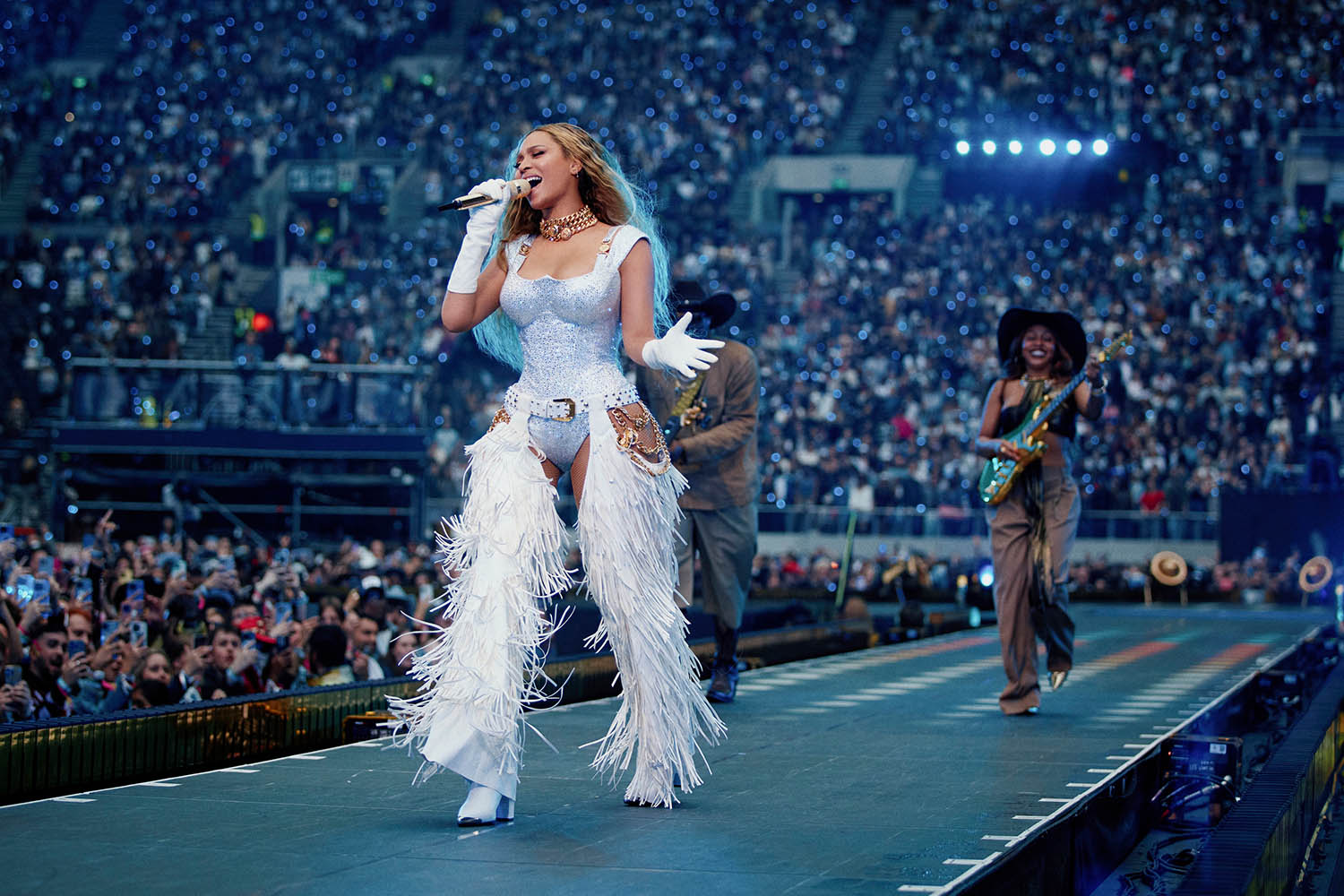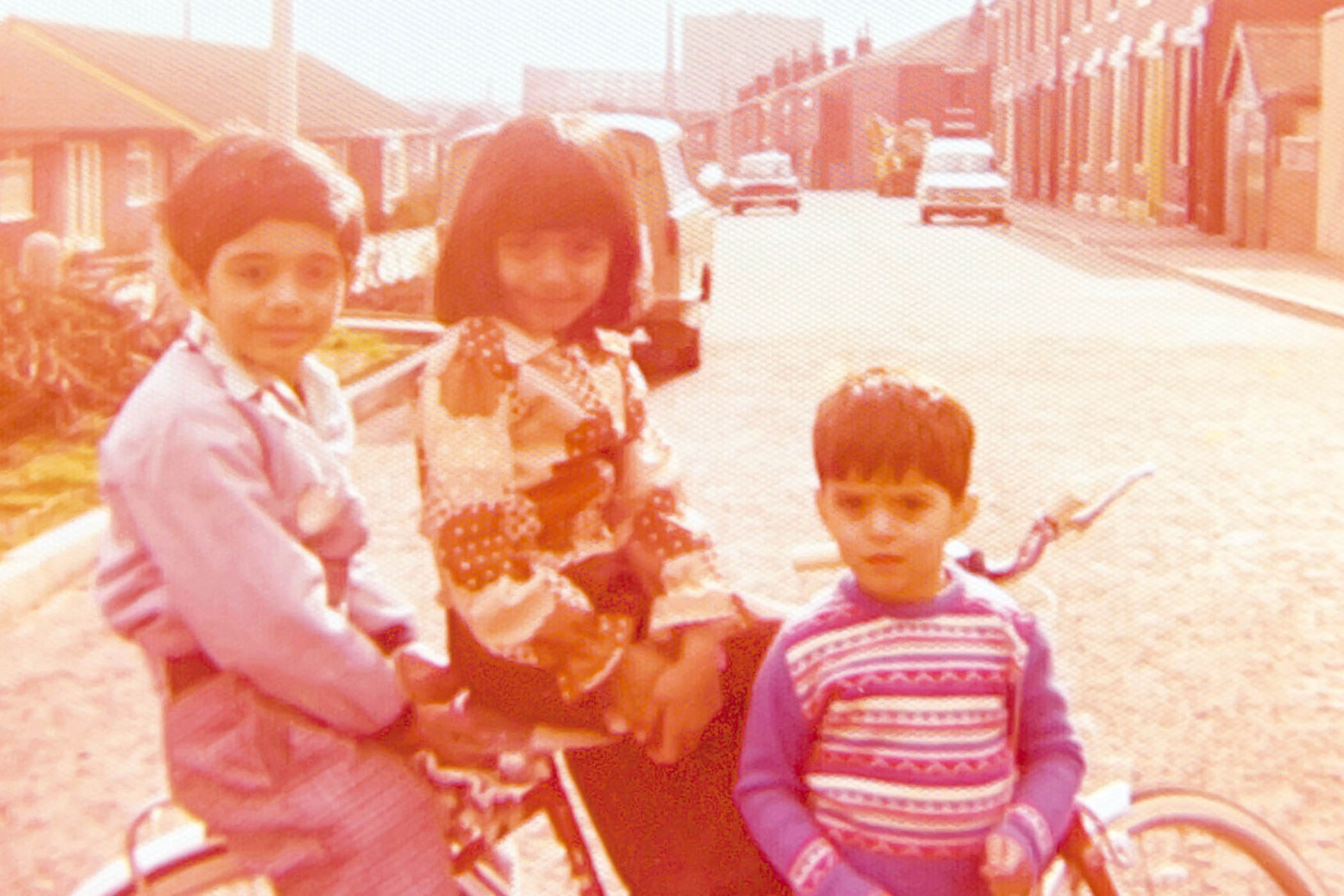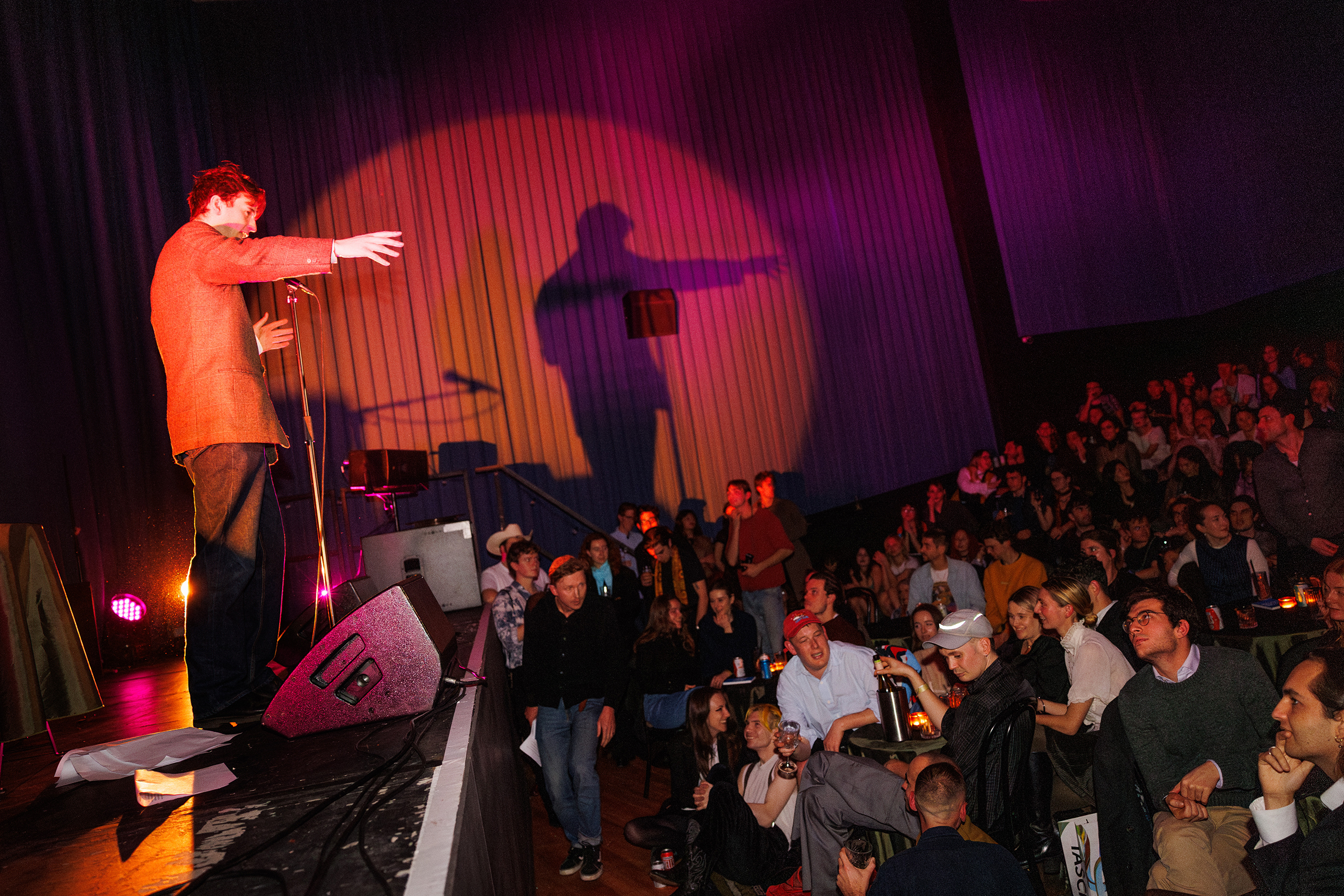“Earned all this money but they never take the country out me,” sings Beyoncé, about a quarter of the way through her Cowboy Carter tour set. Jets of steam billow up from the complex geometric runway to emphasise the point. The singer stops the track – Formation, from 2016 – and enunciates the line slowly: “They’ll never take the country out me.”
Her Cowboy Carter tour – Beyoncé’s album of the same name was released in 2024 – lands in London as a Bey-hawing kaleidoscope of red, white and blue accentuated with a lot of gold bling, a state-of-her-nation address wrapped up in luxe entertainment. It starts with a requiem and ends in a gospel-themed prayer, and across three hours finds ample room for mordant commentary, the Blackness of the American experience, assless chaps and flying cars.
There are detours into flamenco guitars, Irish dancing, opera, poetry (An American Poem by Ras Baraka), adverts for whisky, haircare and Levi’s, and more imagery to process than a Hollywood film lab working to deadline. The hits – most of them truncated – play second fiddle, although there are plenty of crowdpleasing callbacks to her amazing Renaissance tour in 2023.
Its downsides are meteorological – the army of stagehands regularly shoving rainwater off the stage with squeegees more than earn their pay – and affective. The main focus here is Cowboy Carter, which packs in a fair few love songs. The magnificent Crazy in Love (2003) aside, soppy Beyoncé is somewhat less riveting than her alter egos – hell hath no fury Beyoncé, club queen Beyoncé and activist Beyoncé.
If it’s all not as cogent as the queer club music-themed Renaissance, that’s a minor cavil. The eye-watering ticket prices translate into a lot of son et lumière piled on top of much sturm und drang, an insane dress made of LEDs, and a flying horseshoe seat that whips Beyoncé around the nosebleed seats at what are, frankly, unwise speeds.
The brass section is terrific. The audio and visuals across several costume-change interludes could themselves be the subject of a PhD thesis. At one point Beyoncé is pictured wearing a sash that says “The reclamation of America” while smoking a blunt. At another, the statue of Abraham Lincoln, the Republican president who abolished slavery in the US civil war, winks at her.
At its most gripping, then, the Cowboy Carter tour feeds into Beyoncé’s long and rich history of visual spectacle and statement performances. It’s possible other viewers may be more excited by the fact that Blue Ivy, Beyoncé’s eldest, is part of the corps of dancers and frequently steals the show. Her sister, Rumi, comes on for a portrait cameo during Protector, where Blue Ivy frames both her mother and younger sister with her arms, like a painting of a Madonna and child – and child.
The roots of Beyoncé’s dalliance with country music go back nearly a decade, to the making of Lemonade, an album where the Texas-born singer spun the experience of her marital woes into a blockbuster essay about African American lived experience. It included a country track, Daddy Lessons – fabulous tonight – about how a lightly fictionalised Mathew Knowles taught his first-born the ways to deal with trouble and spot a cheater, the inference being Knowles was one himself.
Related articles:
A flying horseshoe seat whips Beyoncé around the nosebleed seats at what are, frankly, unwise speeds
A flying horseshoe seat whips Beyoncé around the nosebleed seats at what are, frankly, unwise speeds
It was a country track because Beyoncé is from Texas, a rifle is mentioned and she is a versatile artist. But when Beyoncé pointedly performed Daddy Lessons at the Country Music Association awards (CMAs) in 2016 alongside fellow Texans the Chicks, there was a backlash – edited highlights of the media brouhaha are reproduced tonight between acts – prompting Beyoncé to delve deeper into the history of Black creatives in country and western.
Happily, blessings for the Cowboy Carter project came from country royalty. Beyoncé’s redrawing of Dolly Parton’s Jolene here comes with the album intro from the Tennessee first lady herself, comparing “Becky” – the other woman villain of Lemonade – to the famous love rival Jolene herself. In Beyoncé’s hands, though, there is no pleading. “You don’t want no heat with me, Jolene,” she seethes, do-si-do-ing threateningly. Tyrant, meanwhile, has a trap beat, a fiddle hook and Parton on backing harmonies (though she is not present tonight).
Newsletters
Choose the newsletters you want to receive
View more
For information about how The Observer protects your data, read our Privacy Policy
Horses – and Black riders – prove a potent shorthand for Beyoncé’s deep dive into the national soul. The Renaissance album cover featured her astride a shiny disco horse (called Reneigh). The Cowboy Carter cover found her wearing a beauty queen sash alongside another equine (nicknamed Chardonneigh), waving a flag.
Blink and you’ll miss it: during one of the changeovers between acts, an early zoetrope-like animation flickers across the screen – a Black man riding a horse, the first motion picture ever made, assembled from stills by the photographer Eadweard Muybridge in the late 1870s. He did not record the Black jockey’s name, but, paradoxically, we do know the thoroughbred mare’s – Annie G.
In the hands of creatives such as Beyoncé – and the celebrated film director Jordan Peele – the sequence becomes less about Muybridge’s concern, how many hooves leave the ground in a gallop, but more about the erasure of Black people from profoundly American narratives. (Peele’s superb 2022 sci-fi film Nope took this same image and ran with it.) Having been told her southern drawl was “too country” in her early days, Beyoncé suddenly found herself “not country enough” for the CMAs, as the set’s first track, American Requiem, lays out. Country in Beyoncé’s hands is both a genre and a wider discourse about nationhood, about how it doesn’t get any more profoundly American than the African American experience, woven as it is into the historical fabric like baseball, hotdogs and apple pie.
Another subplot tonight is how no genre is monolithic, and how anyone should be able to do anything. Daughter – a Cowboy Carter tune that, in part, ponders how Beyoncé might be more like her father than she would like – finds her singing beautifully, and in operatic Italian, interpolating Caro mio ben, an 18th-century love aria attributed to Giuseppe Giordani.
This show suggests that sometimes, maybe, Beyoncé might pack too much into the hours allotted to her – but equally, that there is probably nothing this trailblazing entertainer cannot do.
Photograph by Parkwood Entertainment/PA



